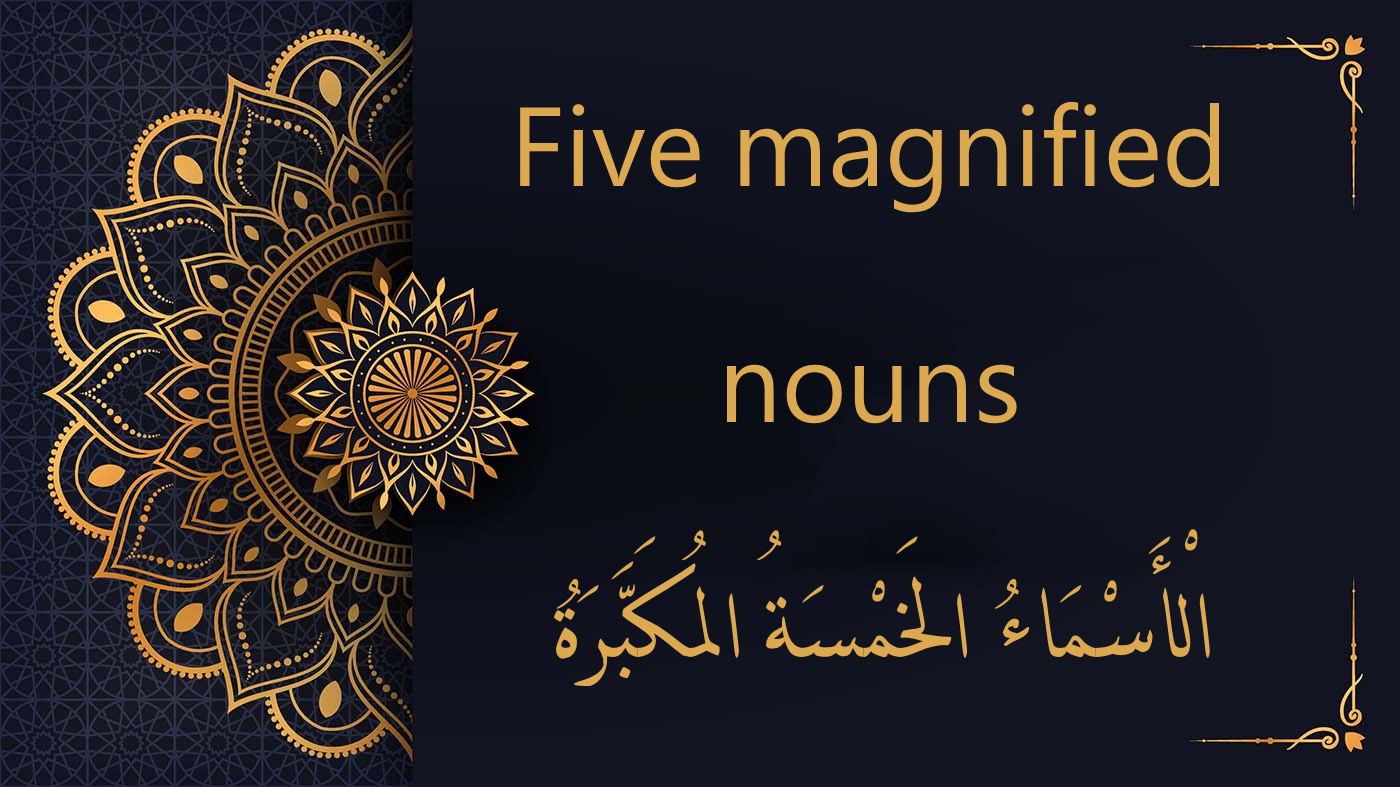
In Arabic, there exists a category of nouns distinguished by specific letters that indicate their grammatical states—nominative, accusative, and genitive. These nouns are referred to as “الْأَسْمَاءُ الخَمْسَةُ المُكَبَّرَةُ” or the five magnified nouns.
The five nouns that demonstrate these distinct states are:
The Arabic pronoun “ذو” and its derivatives imply possession or an attribute. The usage and forms vary depending on gender, number, and grammatical case. Notably, the form “حَمٌ” isn’t found in the Holy Quran. However, other forms of “ذُوْ” are significant, especially in the context of duals and plurals, for both masculine and feminine.
Forms of “ذُوْ” by Number and Case:
Forms of “ذَاتَ” by Number and Case:
In essence, “ذَوٌ” often translates to being the “owner of” or “endowed with.” However, its precise meaning can vary depending on context.
Examples:
وَنُقَلِّبُهُمْ ذَاتَ الْيَمِينِ وَذَاتَ الشِّمَالِ
And We turned them to the right and to the left (18:18)
وَإِن كَانَ ذُو عُسْرَةٍ فَنَظِرَةٌ إِلَىٰ مَيْسَرَةٍ
And if someone is in hardship, then [let there be] postponement until [a time of] ease. (2:280)
وَأَبُونَا شَيْخٌ كَبِيرٌ
and our father is an old man.” (28:23)
وَوَرِثَهُ أَبَوَاهُ
and the parents [alone] inherit from him (4:11)
وَرَفَعَ أَبَوَيْهِ عَلَى الْعَرْشِ
And he raised his parents upon the throne (12:100)
وَجَاءُوا أَبَاهُمْ عِشَاءً يَبْكُونَ
And they came to their father at night, weeping. (12:16)
تَبَّتْ يَدَا أَبِي لَهَبٍ وَتَبَّ
May the hands of Abu Lahab be ruined, and ruined, is he. (111:1)
وَاذْكُرْ أَخَا عَادٍ
And mention, [O Muhammad], the brother of ‘Aad (46:21)
لِيُرِيَهُ كَيْفَ يُوَارِي سَوْءَةَ أَخِيهِ
to show him how to hide the disgrace of his brother (5:31)
إِذْ قَالَ لَهُمْ أَخُوهُمْ نُوحٌ أَلَا تَتَّقُونَ
When their brother Noah said to them, “Will you not fear Allah? (26:106)
كَفَّيْهِ إِلَى الْمَاءِ لِيَبْلُغَ فَاهُ وَمَا هُوَ بِبَالِغِهِ
except as one who stretches his hands toward water [from afar, calling it] to reach his mouth, but it will not reach it [thus]. (13:14)
وَاللَّـهُ ذُو الْفَضْلِ الْعَظِيمِ
and Allah is the possessor of great bounty. (2:105)
يَحْكُمُ بِهِ ذَوَا عَدْلٍ مِّنكُمْ
as judged by two just men among you (5:95)
ذَوَاتَا أَفْنَانٍ
Having [spreading] branches. (55:48)
وَبِالْوَالِدَيْنِ إِحْسَانًا وَذِي الْقُرْبَىٰ
and to parents do good and to relatives, (2:83)
وَحَمَلْنَاهُ عَلَىٰ ذَاتِ أَلْوَاحٍ وَدُسُرٍ
And We carried him on a [construction of] planks and nails (54:13)
وَإِن كُنَّ أُولَاتِ حَمْلٍ
And if they should be pregnant (65:6)
وَأُولَاتُ الْأَحْمَالِ أَجَلُهُنَّ أَن يَضَعْنَ حَمْلَهُنّ
And for those who are pregnant, their term is until they give birth. (65:4)
تَبَارَكَ اسْمُ رَبِّكَ ذِي الْجَلَالِ وَالْإِكْرَامِ
Blessed is the name of your Lord, Owner of Majesty and Honor. (55:78)
You have successfully completed this Arabic lesson, marking the completion of our entire Arabic language course.
Al-dirassa Institute invites you on a linguistic journey with our expert teachers to master the Arabic language. Should you wish to further your studies, we welcome your inquiries.
Discover the experiences of our delighted clients who have thoroughly enjoyed utilizing this standout feature.
Alhamdulillah I‘m very pleased with the arabic and Qur’an lessons I receive from teacher Umm Tasneem and I‘m also content with the al-dirassa administration team who were very quick in answering any questions I had. In a month I progressed a lot and I cannot wait to continue my studies with al-dirassa. May Allah reward everyone at al-dirassa.
Verified review - view original
My Qur’an teacher is fantastic, she teaches me in a loving and kind way where I look forward to the lessons and learn so much. My Arabic teacher is equally as nice and has a lot of patience with me, she has great expertise in the field and I’ve progressed really quickly with her. Thank you Al-dirassa!
Verified review - view original
Don’t want to go through the translation anymore?
30 free minutes with your qualified Egyptian teacher.

Al-dirassa Institute offers you a gift to help you begin your journey to being fluent in Arabic and learning the Quran.

Al-dirassa Institute offers you a gift to help you begin your journey to being fluent in Arabic and learning the Quran.